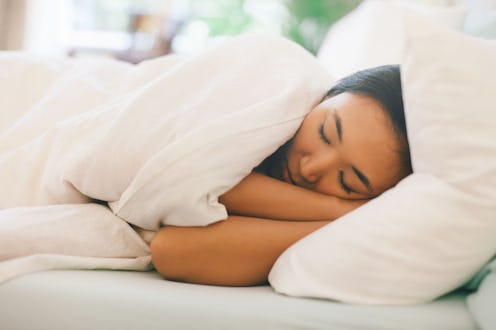Life
FYI, Sleeping On Your Side Could Have This Unexpected Impact On Your Body

It's the most common sleeping position, whether you sleep solo or with a partner, it's super comfy, and it works really well for spooning. But is sleeping on your side bad for you? Back sleepers are more prone to snoring and sleep apnoea, while stomach sleepers are putting themselves at risk of back pain, but what of the side sleepers?
According to the On Health website, 41 percent of us sleep this way — and it's more common among women than men. On the plus side, CNN reports that sleeping in the foetal position is good for preventing back and neck pain as it keeps your spine elongated. It also stops you from snoring as much, as your airways aren't as obstructed as when you sleep on your back.
On Health reports that it's also the best way to sleep if you're pregnant, as it helps boost circulation to both you and the baby. And according to the Eight Mattress website, if you are prone to acid reflux and heartburn, this is the sleeping position for you — particularly if you sleep on the left side. Thanks to the location of your organs, it can also boost your digestion and stimulate the removal of toxins from your lymph nodes, the site states.
But now for the bad news. While it may be good for your overall health, sleeping on your side could be wreaking havoc with your skin. Dee Anna Glaser, professor of dermatology at Saint Louis University, told CNN: "Sleeping on your side can cause you to get wrinkles." Nobody should feel bad about getting wrinkles — it's a natural part of ageing, people — but if you are keen to avoid them, sleeping on your side puts pressure on your skin as it's pressed into the pillow on a nightly basis, causing a drag effect, as confirmed by Health magazine.
It can also alter the shape of your boobs, according to Health magazine's medical editor, Roshini Rajapaksa. This is because the position forces your breasts to hang downwards, thus stretching the ligaments, and causing a sagging effect, as CNN reported. Again, not something that needs to be avoided — in 2018, women can embrace their breast shape and size however they come — but still interesting to know.
According to Greatist website, while sleeping on the left side can be good for digestion, it can also put pressure on the stomach and lungs. The same article reports that if sleeping on your side means you are resting on your arm, you will be restricting blood flow to your arm and hand and pressing down on the nerves, meaning you might find yourself with a dead arm come morning or pins and needles in the night. Another downside is the pressure you are putting on your shoulder, which will be supporting you sleeping on your side and could lead to shoulder pain in the day, Greatist reports.
All in all, there are strong health benefits to sleeping on your side compared with other positions, and the downsides are mostly cosmetic. But there are things you can do to minimise the impact on your skin. For one, consider investing in a silk pillow; this may sound Kardashian-level extravagant but it's so much kinder on your skin, and has been proven to reduce wrinkles compared with cotton cases, according to Insider.
A different pillow could be the cure to other side-sleeping induced woes too, such as neck and shoulder pain. Christopher Winter, medical director of Martha Jefferson Hospital Sleep Medicine Centre and author of the upcoming book The Sleep Solution told Health magazine: “Something that keeps the head and neck in place and even separates the knees creates that neutral position you want while you sleep." He goes on to stress the importance of selecting firm pillows with contours for head and neck.
And for extra protection against skin damage, don't forget your night cream. Marie Claire suggests looking for super-concentrated creams fortified with Vitamins C and E and hyaluronic acid, which will plump up your skin, so slap it on and sleep easy.